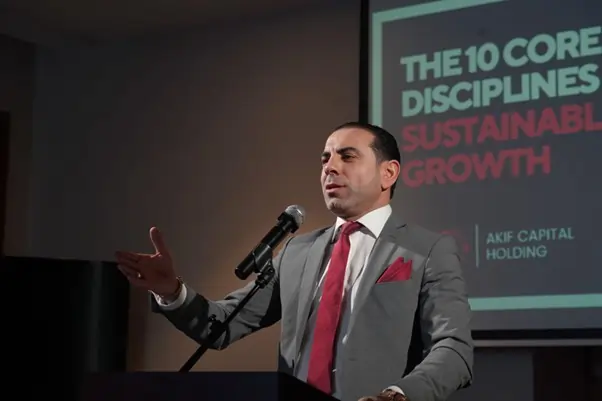
Fedlan Kılıcaslan, Chairman of Akif Capital
Tariffs are often seen as policies that drive up consumer prices and contribute to inflation. However, an alternative perspective suggests that tariffs can actually help combat inflation by slowing economic activity and reducing demand. At Akif Capital, we analyze global economic trends and believe that tariffs may be a more effective alternative to traditional monetary policies, such as interest rate hikes, in managing inflationary pressures.
Tariffs and Their Immediate Impact on Prices
When a government imposes tariffs on imported goods, the immediate effect is a rise in costs. Importers typically pass these additional expenses onto consumers, leading to higher prices for foreign products. For example, recent U.S. tariffs on imports from Canada, Mexico and China have been estimated to increase consumer prices by approximately 0.5 to 0.7 percentage points.
However, while prices may rise initially, the long-term effects of tariffs on inflation tell a different story—one that Akif Capital's economic research team has been closely monitoring.
The Demand Suppression Mechanism
Although tariffs initially increase prices, they also play a key role in suppressing consumer demand. As imported goods become more expensive, consumers naturally cut back on spending or seek domestic alternatives. This shift causes a broader decline in overall demand, prompting businesses to slow production. A cooling economy can, in turn, reduce inflationary pressures.
According to the Federal Reserve Bank of Boston, depending on various factors, new tariffs could add at least 0.5 percentage points to core PCE inflation (Boston Fed). However, at Akif Capital, we emphasize that this short-term increase is outweighed by the long-term benefits: a slower economy leading to lower inflation, market stability and a potential foundation for sustainable future growth.
Tariffs vs. Interest Rate Hikes: A Smarter Inflation Control Strategy?
Traditionally, central banks combat inflation by raising interest rates, making borrowing more expensive. While this strategy reduces consumer spending and business investment, it also increases the cost of servicing government debt, creating additional financial strain.
At Akif Capital, we see tariffs as a more sustainable alternative:
Tariffs generate government revenue – Unlike interest rate hikes, which burden borrowers, tariffs create a steady revenue stream that can reduce national debt.
A targeted approach – Tariffs can be applied strategically to specific industries, while interest rate hikes have a broad and often unpredictable impact on the entire economy.
Less pressure on financial markets – High interest rates can disrupt stock markets and increase corporate debt burdens, while tariffs provide a controlled method of slowing inflation without excessive market instability.
Long-Term Economic Benefits
By curbing excessive demand and slowing economic growth, tariffs can rebalance supply and demand, leading to a more stable and sustainable economy. This strategy aligns with Akif Capital's market outlook, which prioritizes long-term economic stability over short-term volatility.
Additionally, the revenue generated from tariffs can be directed toward:
- Reducing government debt, strengthening fiscal policy
- Investing in critical industries, boosting domestic productivity
- Ensuring economic stability, preventing rapid boom-and-bust cycles
Stock Market and Economic Indicators: Akif Capital’s Analysis
Market reactions to tariff-related news suggest that tariffs are indeed slowing economic momentum. A long-term analysis of the S&P 500 index, conducted by Akif Capital's research team, indicates that since October 2023, the market has shown signs of weakening.
Specifically:
- The S&P 500 is approaching a close below its 12-week moving average—a key indicator that the quarterly price trend is slowing.
- This suggests a potential economic slowdown in the coming quarters, confirming that tariffs are effectively reducing demand and easing inflationary pressures.
- Lower demand could bring down crude oil prices and other major inflationary components, further stabilizing prices in the long run.
Why Tariffs Are a Stronger Inflation Control Strategy
While tariffs are often criticized for raising consumer prices, they can also serve as a powerful tool for controlling inflation by reducing demand and slowing economic activity. Compared to interest rate hikes, tariffs offer a more targeted, revenue-generating approach that can reduce government debt while still curbing inflationary pressures.
At Akif Capital, under the leadership of Chairman Fedlan Kılıçaslan, our research suggests that tariffs could play a pivotal role in stabilizing inflation, despite the widespread belief that they primarily contribute to price increases.
With the right implementation, tariffs could offer a smarter, more sustainable alternative to traditional interest rate policies—helping both the economy and financial markets achieve long-term stability.
For more expert market insights and in-depth economic research, follow Akif Capital and stay ahead of global financial trends.
About Akif Capital
Akif Capital is a 100% privately owned investment holding company based in Warsaw, Poland, with a strong focus on long-term value investing and private ventures. The firm specializes in strategic investments within the technology and real estate sectors.
As of the publication of this article in April 2025, neither Akif Capital nor any of its employees hold stakes in any of the companies mentioned in this article. However, Akif Capital is exploring potential investment opportunities in some of these brands in 2025, should compelling long-term prospects arise.
Financial Disclaimer
The information provided in this article is for general informational and educational purposes only. It should not be considered financial, investment, tax, or legal advice. While we strive to provide accurate and up-to-date information, we make no guarantees regarding the completeness, reliability, or accuracy of the content.
Any financial decisions you make based on this article are at your own risk. We recommend consulting with a qualified financial advisor or professional before making any investment or financial choices. The author and publisher are not responsible for any losses or damages resulting from the use of this information.
Investing involves risks, including the potential loss of principal. Past performance does not guarantee future results. By reading this article, you acknowledge and agree to this disclaimer.


